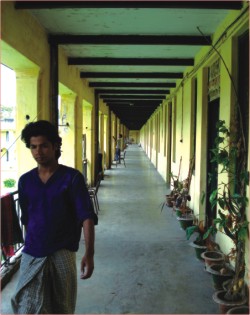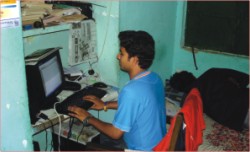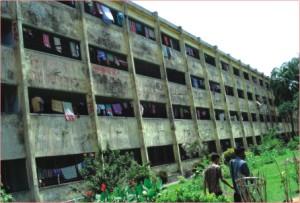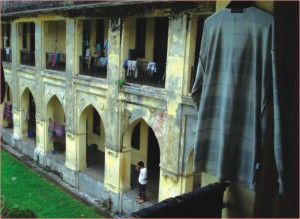|
Spotlight
Dormitory Home away from home
 If you are a student in a public university, you know what is a hall, don't you? You need to be attached to a residential hall. Apart from being the address, a hall is the identity of a student certifying him/her as a bona fide student of the university. A hall or dormitory becomes the home away from home. If you are a student in a public university, you know what is a hall, don't you? You need to be attached to a residential hall. Apart from being the address, a hall is the identity of a student certifying him/her as a bona fide student of the university. A hall or dormitory becomes the home away from home.
Students get their roll numbers and admit cards to appear exams according to hall enrollment. Students are categorized in two ways: residential students and non-residential students. Irrespective of categories, all students must be attached to halls.
Today's story is all about the residential students of the Dhaka University and BUET. Let us learn about their life experiences, general feelings and the ways of leading their lives while residing in halls.
It has been observed that students who are not from local backgrounds are the ones who are actually the residential students of the universities. The reason is obvious: without living in Dhaka, it is difficult to attend classes and activities in universities.
Hall life is favorable for the residential students for a categorical reason. Students get the facility to live in Dhaka especially in the university area at a comparatively very low cost. The standard of living one enjoys in a hall would be much more expensive in outside hotels. Food is available at an unbelievably low price. Further, there is no accommodation cost required because all the halls are in the campus area. In other countries of Asia and Europe, accommodation cost for students are very high. In this regard Dhaka University and BUET halls facilitate better living.
The positive aspect of hall-life
 All the students as they reside in the same area keep campus vibrant by organizing academic programs regularly. Hall students regularly engage themselves in different inter-hall sports competitions, debate and cultural activities. Halls help students to be lively and friendly with each other as well as create healthy academic environment. All the students as they reside in the same area keep campus vibrant by organizing academic programs regularly. Hall students regularly engage themselves in different inter-hall sports competitions, debate and cultural activities. Halls help students to be lively and friendly with each other as well as create healthy academic environment.
Hall life teaches students democratic norms and practices. Each year a hall-committee is elected to manage hall activities. The hall committee processes take place like the parliamentary system. Students are allowed to vote for a committee that consisted students. This practice helps the students to remain united and learn to respect the democratic norms. The practice has been maintained since the early sixties.
Apart from all these, hall teaches students the value of community living and ways to cope with adverse situations. Many students from many places come and live in the same hall. Despite oddities, hall-life ensures that students live in harmony by sharing and caring. For example in a hall room there are at least 3-4 people. Not necessarily they all would be from the same subjects or districts. Besides, they can be seniors or juniors. But they manage themselves quite well and live happily without any obstacles.
But there are negative sides as well
 The first and the basic problem is that, the halls are brutally politicized. Cadre-based muscle powers are being practiced by the student leaders. The leaders even compel first year students to go to processions and meetings as a criterion for getting seat as a resident student in a hall. The first and the basic problem is that, the halls are brutally politicized. Cadre-based muscle powers are being practiced by the student leaders. The leaders even compel first year students to go to processions and meetings as a criterion for getting seat as a resident student in a hall.
In addition to this, halls have become the safe havens for criminals. Political and social criminals take refuge in the disguise of students. It is these elements that disrupt the normal environment of hall life.
Interestingly, both these problems do not exist in BUET halls. Food and sanitation are two major problematic issues in the halls. The cooking is not up to the mark and the standard is very poor. Quantity and quality both stays right behind.
Let's check the student-views on this issues
 Bony Amin of Haji Muhammad Mohsin Hall mentioned two options in the hall to have meal. One is the hall canteen and the other is the mess. “I prefer to have my meal at the Mess because it is cleaner and the food is available in my name as I pay at the beginning of the month for it. Otherwise more or less it's the same! If you look at the dal, your first impression would be it's nothing but yellow-color water. Only after you taste it, you can guess that it might be the dal !” Bony Amin of Haji Muhammad Mohsin Hall mentioned two options in the hall to have meal. One is the hall canteen and the other is the mess. “I prefer to have my meal at the Mess because it is cleaner and the food is available in my name as I pay at the beginning of the month for it. Otherwise more or less it's the same! If you look at the dal, your first impression would be it's nothing but yellow-color water. Only after you taste it, you can guess that it might be the dal !”
Arif Billah from the same Hall agreed to the fact and added that the toilets are really in dire need for renovation and is dirty most of the time.
Bug is another problem in Mohsin Hall. While talking about the accommodation experience in the first year, Shahidul Islam Chowdhury mentioned that he was accommodated in a room where 15-20 students live. It was an awful experience and the students only just passed the night there. Some of them slept but most of them couldn't. Shahjahan Zico used to go to the roof with his guitar and other 'Gono-room' mates and sing whole night for fun.
It is only at the end of first year that students get accommodation in a room consisting of four beds.
On the other hand, BUET halls are quite different in this regard. A first year student easily gets a seat and remains there till the end of his academic career. As usual for the better maintenance, the halls are cleaner and neater. And the basic difference with DU Hall is, each room of a BUET hall consists of 4/5 personal computers. In every stair corner there are two trash boxes for recyclable and non-recyclable wastes. The environment is somewhat quieter than DU halls because all the exams in different departments are held more or less in the same time.
The present scenario of hall life in DU
 The present scenario of the hall is somewhat better as they have no political influences from any side. Due to the existing peaceful political context of the country, there are no processions, and hence students do not need comply with the demands of so-called leaders to attend processions or meetings. And also students are free from the fear of political influence by the seniors to in order ensure their seats. The present scenario of the hall is somewhat better as they have no political influences from any side. Due to the existing peaceful political context of the country, there are no processions, and hence students do not need comply with the demands of so-called leaders to attend processions or meetings. And also students are free from the fear of political influence by the seniors to in order ensure their seats.
One more development has occurred in terms of hall management. A bridge has been created now among the teachers and the residents with tutors actively looking after the welfare of students. This was previously quite unheard of, so to say.
Students now can seriously engage themselves in the academic activities without any abnormal situation. Mehedi Hasan of Salimullah Muslim Hall mentioned that throughout his five-year hall life, he is experiencing the best possible environment at present.
Hall is not a home
As regards preference between the Hall life and home, Md Najmul Islam of Mohsin Hall and Monirul Hoque of Salimullah Hall said, “To be honest, we miss our family, and we miss our mother's cooking too. At first we used to wonder why on earth we had come to Dhaka . But slowly we got used to it and now everything is normal.” Sajidul Islam Shaon of Salimullah Hall mentioned of washing own clothes which he considers world's most difficult job in hall life, specially washing jeans. The barriers for Halls for 'not being home' are manifold. Substandard food and over-accommodation than the actual are the two things that create vast differences between halls and homes. In answering the same question Salimullah Hall's provost Professor Dr. Nurul Islam said that because of the muscle power practiced by the political students, many students do not pay for their meals or pay less than the actual price. As a result to meet up the cost the standard of the food decreases. Moreover those students call the tender for canteen food supply. So the problem carries on. Apart from these, it takes time to adjust in a totally different environment without family support.
However, nowadays things have started to change about food and sanitation problems. He further added that when he himself was a resident student from outside people who used come and have their meals in the Halls.
 The major difference between a resident and nonresident student is the family and financial support, said Habibur Rahman from CSE department of BUET. The fact is resident students are more disciplined and are in a system among his family. There he gets stronger financial support and within a short time. But it's a difficult process to maintain academic life and day to day life without family involvement. Apart from academic and cultural activities to gain stronger financial support, students opt to do tuitions. But at the end the of day the income is too meager after the hard work throughout the month. The major difference between a resident and nonresident student is the family and financial support, said Habibur Rahman from CSE department of BUET. The fact is resident students are more disciplined and are in a system among his family. There he gets stronger financial support and within a short time. But it's a difficult process to maintain academic life and day to day life without family involvement. Apart from academic and cultural activities to gain stronger financial support, students opt to do tuitions. But at the end the of day the income is too meager after the hard work throughout the month.
“I like hall life for my freedom which might not be possible being with the family'', said Nishat. He said he can go to the TV room even if there is an exam tomorrow. Bony Amin loves the 45inch TV of his hall as he is one of the greatest sports loving personalities in Mohsin Hall.
Moreover non-resident students regularly go to halls for 'addas' and stuffs which can't be done in home. Again all the friends are there to hang around, and it gives them the greatest opportunity to actively take part in all the student-based cultural and academic programs.
The funniest part of this entire saga is, the non-resident students believe that Hall life is far better than the family life restricted by parental guidance. And the resident students believe that things would have been much easier having family around.
Let me mention one last thing. Just before the exam it's a common scenario that the resident and non-resident students are doing group studies. Very positive aspect of university life, isn't it so? If you still don't believe, there is the “Nishat's Pathshala”, the undisputedly super hit study-group in Mohsin Hall currently!
Copyright
(R) thedailystar.net 2007
|
